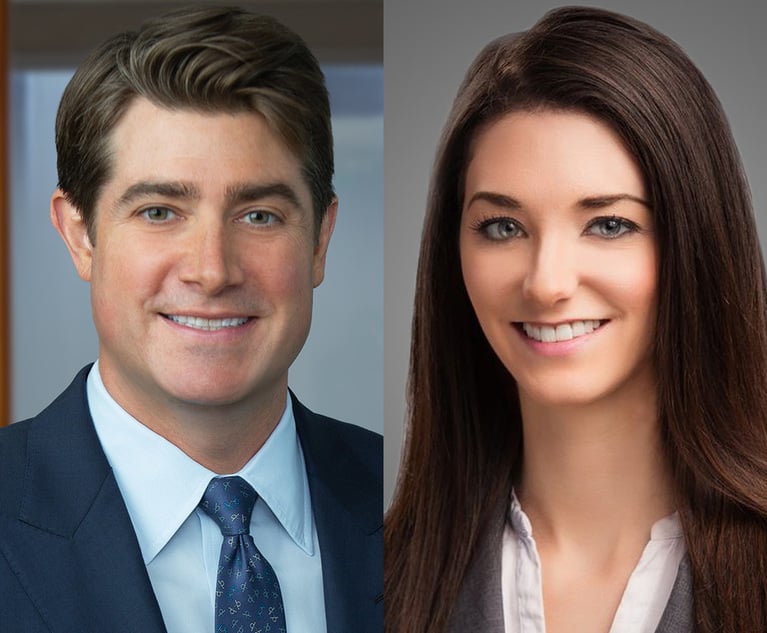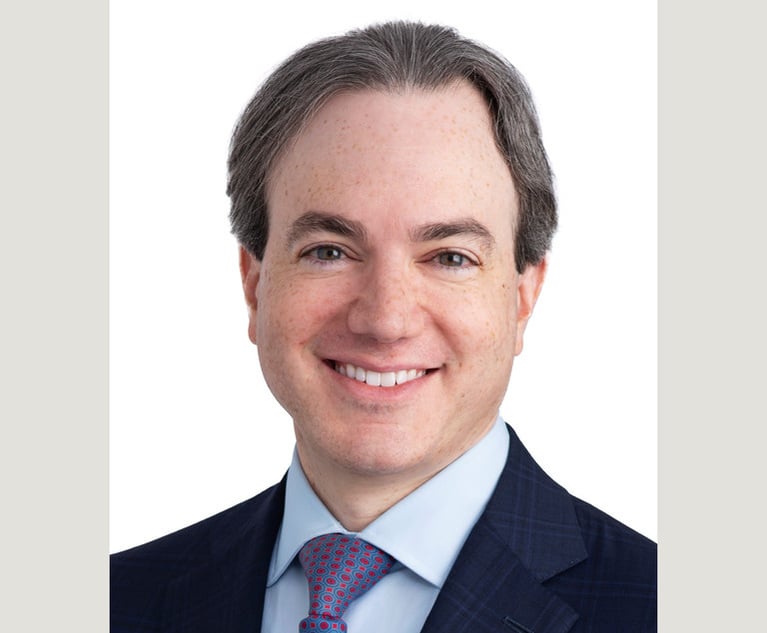Texas Criminal Defense Attorneys Could Face New Liability Under High Court Case
The case, "Gray v. Skelton," involves a dispute between attorney Patricia Skelton, who was convicted in 2007 of forging the will of a client, but her conviction was overturned because of ineffective assistance of her criminal defense attorney, Guy James Gray.
September 26, 2019 at 04:17 PM
4 minute read
 Photo: William Potter/Shutterstock.com
Photo: William Potter/Shutterstock.com
Texas Supreme Court justices on Thursday considered questions about whether an exonerated criminal defendant must be declared "actually innocent" to sue a criminal defense attorney for legal malpractice, and how the statute of limitations might apply to those claims.
The case, Gray v. Skelton, involves a dispute between attorney Patricia Skelton, who was convicted in 2007 of forging the will of a client, but her conviction was overturned because of ineffective assistance of her criminal defense attorney, Guy James Gray. Prosecutors dismissed Skelton's charge rather than retrying her case, and later, Skelton sued Gray for legal malpractice.
The dispute before the high court involves arguments to extend two long-established legal malpractice precedents. In 1995's Peeler v. Hughes & Luce, the Texas Supreme Court ruled that only an exonerated criminal defendant is allowed to sue a criminal defense attorney for legal malpractice. The high court's 1991 ruling in Hughes v. Mahaney & Higgins says that the statute of limitations is tolled in a legal-malpractice case until the underlying litigation, where the alleged malpractice occurred, is completely finished.
On one side, Gray's attorneys argue that Skelton wasn't technically exonerated because she wasn't declared actually innocent, which means the Peeler doctrine bars her claims. However, Skelton counters that the Peeler doctrine allows legal-mal claims when convictions are otherwise overturned, and that Skelton's situation qualifies.
Gray is arguing for the justices to find that Hughes tolling started the clock on the statute of limitations when Skelton lost her direct appeal in 2011. In contrast, Skelton argues that the justices should extend Hughes tolling to begin limitations when her conviction was overturned and prosecutors dismissed her charges.
At the oral argument, some justices indicated that actual innocence is an element of exoneration under the Peeler doctrine, and multiple justices seemed wary to draft a tolling rule that would inadvertently create an infinite statute of limitations.
Justice Jeff Boyd asked Skelton's attorney, Leslie Sara Hyman of Pulman, Cappuccio & Pullen in San Antonio, whether she would agree if the Supreme Court found that Skelton did need an actual innocence finding to sue for legal malpractice, but then allowed her to prove that as a causation element during the proceeding on her legal-mal claims.
Hyman said she would not object. However, Gray's attorney, Scott Douglass & McConnico partner Jane Webre of Austin, said she doesn't think it's appropriate for the court to allow a client to argue she's actually innocent during a legal-mal case. That should be a threshold matter before a client is allowed to sue her attorney, Webre said.
Justice Brett Busby said that in the federal courts, limitations are tolled until the end of a direct appeal, but then if a defendant seeks state post-conviction habeas relief, that would again pause limitations. Busby asked whether it was a viable option in Texas courts.
Webre said that type of rule would create tremendous uncertainty because in Texas, there's no deadline to seek post-conviction habeas relief, and some defendants initiate multiple habeas proceedings.
"It's maybe never that limitations run," she said, urging the justices to draw a "bright line" for Hughes tolling to begin when a direct appeal ends, so that parties have clarity and certainty.
On the other side, Hyman said the Hughes tolling rule is supposed to toll limitations until litigation is concluded. For Skelton, that happened after she won habeas relief to overturn her conviction, and a prosecutor dismissed her charge.
Justice Eva Guzman said a criminal-defendant may win habeas relief within three years, or it could be 20. If the court allowed tolling for such a long time, it could create "long tail liability" for lawyers, she said.
Justice Jane Bland said it seemed like Hyman was arguing for an endless, infinite exception to the statute of limitations for criminal defendants to sue their attorneys. That's not in law the legislature passed, she noted.
In reply, Hyman said the judiciary, not the Legislature, created both the discovery rule, which allows a client to sue for legal malpractice within two years of the time they discovered the malpractice, and the Hughes tolling rule. Philosophically, it's no different to hold that Hughes tolling in a criminal case applies when a habeas corpus proceeding overturns a conviction, she said.
This content has been archived. It is available through our partners, LexisNexis® and Bloomberg Law.
To view this content, please continue to their sites.
Not a Lexis Subscriber?
Subscribe Now
Not a Bloomberg Law Subscriber?
Subscribe Now
NOT FOR REPRINT
© 2025 ALM Global, LLC, All Rights Reserved. Request academic re-use from www.copyright.com. All other uses, submit a request to [email protected]. For more information visit Asset & Logo Licensing.
You Might Like
View All
Haynes and Boone Expands in New York With 7-Lawyer Seward & Kissel Fund Finance, Securitization Team
3 minute read
'None of Us Like It': How Expedited Summer Associate Recruiting Affects Law Students and the Firms Hiring Them

Big Law Firms Sheppard Mullin, Morgan Lewis and Baker Botts Add Partners in Houston
5 minute read
Trending Stories
- 1Contracts Game Changer? One-Sided ADR Provision Overturned
- 2Attorney Says Seeking Justice for Inmate's Death Requires Systemic Change as Well as Compensation
- 3Justice 'Weaponization Working Group' Will Examine Officials Who Investigated Trump, US AG Bondi Says
- 4Judge Accuses Trump of Constitutional End Run, Blocks Citizenship Order
- 5Brooklyn Prosecutor Returns to Private Practice to Co-Found Wrongful Conviction Boutique
Who Got The Work
J. Brugh Lower of Gibbons has entered an appearance for industrial equipment supplier Devco Corporation in a pending trademark infringement lawsuit. The suit, accusing the defendant of selling knock-off Graco products, was filed Dec. 18 in New Jersey District Court by Rivkin Radler on behalf of Graco Inc. and Graco Minnesota. The case, assigned to U.S. District Judge Zahid N. Quraishi, is 3:24-cv-11294, Graco Inc. et al v. Devco Corporation.
Who Got The Work
Rebecca Maller-Stein and Kent A. Yalowitz of Arnold & Porter Kaye Scholer have entered their appearances for Hanaco Venture Capital and its executives, Lior Prosor and David Frankel, in a pending securities lawsuit. The action, filed on Dec. 24 in New York Southern District Court by Zell, Aron & Co. on behalf of Goldeneye Advisors, accuses the defendants of negligently and fraudulently managing the plaintiff's $1 million investment. The case, assigned to U.S. District Judge Vernon S. Broderick, is 1:24-cv-09918, Goldeneye Advisors, LLC v. Hanaco Venture Capital, Ltd. et al.
Who Got The Work
Attorneys from A&O Shearman has stepped in as defense counsel for Toronto-Dominion Bank and other defendants in a pending securities class action. The suit, filed Dec. 11 in New York Southern District Court by Bleichmar Fonti & Auld, accuses the defendants of concealing the bank's 'pervasive' deficiencies in regards to its compliance with the Bank Secrecy Act and the quality of its anti-money laundering controls. The case, assigned to U.S. District Judge Arun Subramanian, is 1:24-cv-09445, Gonzalez v. The Toronto-Dominion Bank et al.
Who Got The Work
Crown Castle International, a Pennsylvania company providing shared communications infrastructure, has turned to Luke D. Wolf of Gordon Rees Scully Mansukhani to fend off a pending breach-of-contract lawsuit. The court action, filed Nov. 25 in Michigan Eastern District Court by Hooper Hathaway PC on behalf of The Town Residences LLC, accuses Crown Castle of failing to transfer approximately $30,000 in utility payments from T-Mobile in breach of a roof-top lease and assignment agreement. The case, assigned to U.S. District Judge Susan K. Declercq, is 2:24-cv-13131, The Town Residences LLC v. T-Mobile US, Inc. et al.
Who Got The Work
Wilfred P. Coronato and Daniel M. Schwartz of McCarter & English have stepped in as defense counsel to Electrolux Home Products Inc. in a pending product liability lawsuit. The court action, filed Nov. 26 in New York Eastern District Court by Poulos Lopiccolo PC and Nagel Rice LLP on behalf of David Stern, alleges that the defendant's refrigerators’ drawers and shelving repeatedly break and fall apart within months after purchase. The case, assigned to U.S. District Judge Joan M. Azrack, is 2:24-cv-08204, Stern v. Electrolux Home Products, Inc.
Featured Firms
Law Offices of Gary Martin Hays & Associates, P.C.
(470) 294-1674
Law Offices of Mark E. Salomone
(857) 444-6468
Smith & Hassler
(713) 739-1250






